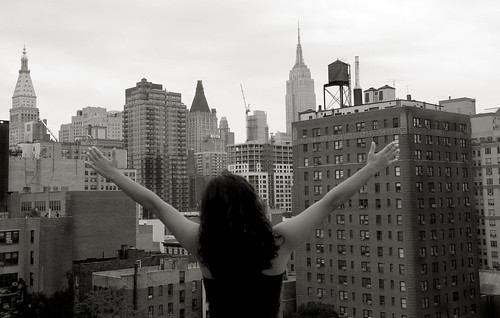As I stepped up to the door of the filed house, I saw my reflection in the glass, and I started worrying. I had chosen mesh shorts, a white V-necked T-shirt, and tattered old sneakers in hopes of fitting in with the community I planned to observe: people exercising for fitness inside the gym. I was worrying about how well I would fit in. After my visit, I realized I fit in quite well. Not only had I dressed appropriately, but I was also worried, and worrying about appearance seemed to be one trait everybody at the gym shared. It seems to be the attribute that defines this community and ties its members together.

As I stepped inside the training room I heard heavy breathing and strenuous shouts of "One! Two! Three!" Weightlifters, mostly men, were grunting, screaming, moaning, and yelling, and yelling in agony as they tried to lift weights two, three times more than they could handle. Their heads turned tomato red, and they looked as if they were about to explode. I'm neither a man nor a weightlifter, and I had no idea why they were trying to overexert themselves, or so it seemed to me.

When I spoke with several of the weightlifters, they admitted that for many people who spend time lifting weights, appearance is a primary concern. They claimed that many male weightlifters begin exercising because they fell inferior about their physical appearance or because they want to get that "He-man" or "Caveman" look that they consider an ideal for men. Though the men I talked to said that they, personally, weren't that anxious about the way they looked, they also admitted that they felt that potential dates pay more attention to a man who has "bulked up." I asked why they felt it was important to have a muscular and masculine appearance in today's society, especially when a lot of people (women especially) talk about the need for men to be "sensitive." I was surprised by the answers because they seemed to reveal worry and insecurity--which was surprising coming from a group of very well-muscled college men. The weightlifters said they thought sensitivity was a good thing, and they claimed to work toward it in their relationships. They also said that sensitivity grows out of self-confidence, and that for men self-confidence often comes through physical fitness and athletic ability.

Though the weightlifters seemed sincere, as a woman I felt rather awed by their appearance and kept waiting for one of them to knock one of the female exercisers over the head and drag her back to his cave. This thought made me shift my attention to the women, most of whom were working on machines like Stair Masters, stationary bicycles, or Nautilus. To enter into the women's part of this community, I squirmed my way through the machines and people, and I found a spot on one of their Stair Masters. I stared curiously at the screen in front of me. Blinking letters zoomed across the screen asking me to enter my weight. "Enter my weight," I thought. "That's a lot to ask of a girl." I even thought about lying, but then I got embarrassed about lying to a machine. Later, when I shared this worry with some of women at the gym, I realized they shared my apprehension and a lot of my other worries.
Like the men, the women shared many concerns about their appearance, especially about their attractiveness and about the relationship of appearance to self-confidence. They spoke of how the Baywatch girls are the ideals of appearance for women in our society, and of how they felt a need to compete with the "Barbies" of this world, even though such an appearance is unrealistic for the average women. They also talked about having a kind of balance scale in their heads. As their weight increases, they feel less attractive, and as their weight decreases, they feel more attractive. They pointed out how magazines, TV programs, and movies seem to equate thinness with attractiveness and link attractiveness to self-confidence. Though they admitted that working women with responsibilities as wives and mothers might not have time or energy to work out in a gym, they worried about how their self-confidence might suffer if they didn't have the opportunity to exercise to control their weight.
After my time on the Stair Master came to an end and I had finished talking to the members of the gym community, I left, feeling as though I fit in. I was a worrier and I had dressed like many of the women. On my way out, however, I passed a woman dressed in a daring pink and black outfit who began turning heads as soon as she walked in the door. I started worrying again, and I knew the people in this gym were now worrying even more about their looks.
Topic: write about a community of some sort, taking the perspective of an outsider trying to understand how the community and what kinds of relationships people in the community form.
Written by Sarah Lake (from Patterns of Exposition)














